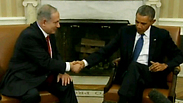
Israel isn't alone.
צילום: רויטרס
Israel should engage international community to forge peaceful future
Current Gaza op gives Israel a chance to invest in long-term peace, but first the right must abandon the mindset of Israel vs. the world.
Israel is winning the Gaza war. Hamas’ military capabilities have been severely degraded, it has few credible regional allies, and there is some evidence that even the Gazan population is growing weary of Hamas’ mismanaged rule. Still, without a larger strategic agenda, Israel will only be putting off another round of violence for another time, with all the associated costs. This is a moment of opportunity—one for Israel to engage closely with the international community to advance its interests. Israel already missed a chance to do so while weakening Hamas further, at the moment of the Fatah-Hamas reconciliation agreement. It should not miss another opportunity.
Relying on the international community runs counter to the deeply-held Israeli narrative that Israel, based on centuries of collective Jewish experience, is a nation that dwells alone. There is an inherent mistrust of the rest of the world embedded in the national ethos, particularly in the Jewish sector, and especially on the right. This leads to a sense of eternal siege and/or a lack of interest in working with others when Israel’s security is deemed at risk.
In some ways it is appropriate: anti-Semitism, the Holocaust, and lack of real effort by the Western power to stop the terrorism directed against Israelis since the 1950s have led to a sense that in the end, despite whatever diplomatic support or military aid it gets from others, Israel is on its own. No-one will come to its rescue at the moment of truth.
The paradox, of course, is that Israel has never been more integrated into global institutions. At the United Nations it may soon contest for a seat on the Security Council. It has 10 free trade agreements, including with the European Union, North America, and parts of Latin America, and increasingly close bilateral relations with countries in all regions of the world. The Europeans were also willing to work with Israel to finesse the settlement issue to bring it into the Horizon 2020 program.
It’s certainly true that the Middle East is a hostile place for Israel. But even here Israel retains good relations with Jordan and Egypt, and there are openings for cooperation with other states, including Saudi Arabia. Despite the anti-Semitism of the Turkish leadership, Israel is still expanding trade ties with that country.
But to build on these Israel must demonstrate a willingness to meet the Arabs’ concerns at least halfway. Accepting the Arab Peace Initiative as the basis for negotiation would be one way to do so. Strengthening rather than undermining Mahmoud Abbas and Fatah is another.
Reducing the crueler manifestations of the occupation—removing some checkpoints, enforcing stricter discipline and better behavior among individual soldiers engaged in operations in the West Bank, and ending construction outside the main settlement blocs—are a third way. These are all cost free to Israel, and doing so would improve its position vis-à-vis not only Middle Eastern states but also European countries.
But Israel will have to go further. Hamas is at its weakest position in years, but Israel cannot put the moment to its advantage without help from others. This will require two specific actions: First, bringing Fatah back to Gaza, and second, binding Hamas to the institutions of the Palestinian Authority. Without giving Hamas some incentive to participate in these institutions (most likely through the mechanisms established by the recent agreement with Fatah), it will quickly return to attacking Israel as the only way out of its isolation.
Both actions will require funding to strengthen Fatah and to rebuild Gaza, as well as some means for making sure Hamas cannot rearm to any significant degree or kick Fatah out of Gaza again. Israel cannot do this on its own. The United States, Europe, the United Nations, and regional states are needed to this end.
None of this is a call for Israel to disarm itself and rely on others for its own security. Though that is how many perceive such ideas, they need to get over their hostility. Contrary to what some believe, Israel cannot survive on its own—indeed, it has always relied on help from others, for arms, diplomatic protection, trade, and international legitimacy. Only North Korea gets along without these things, and it—and its citizens—simply exist more than live. That cannot be the model that a vibrant Israeli society aspires to.
In short, Israel benefits enormously from its diplomatic, economic, strategic, and cultural ties to the world. This must be the starting point for its policy in the aftermath of the Gaza war.
Brent E. Sasley is Associate Professor of Political Science at the University of Texas at Arlington. He tweets at @besasley.










